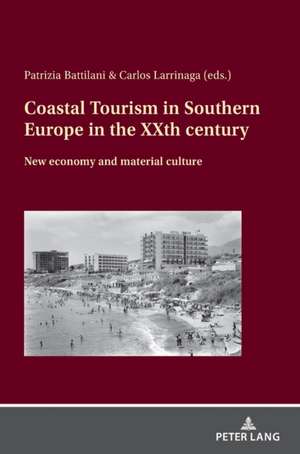Coastal Tourism in Southern Europe in the XXth century
Editat de Carlos Larrinaga Rodríguez, Patrizia Battilanien Limba Engleză Hardback – 10 noi 2021
Preț: 371.57 lei
Nou
Puncte Express: 557
Preț estimativ în valută:
71.10€ • 73.46$ • 59.15£
71.10€ • 73.46$ • 59.15£
Carte tipărită la comandă
Livrare economică 20 martie-03 aprilie
Preluare comenzi: 021 569.72.76
Specificații
ISBN-13: 9783631864715
ISBN-10: 363186471X
Pagini: 186
Dimensiuni: 153 x 216 x 15 mm
Greutate: 0.4 kg
Editura: PETER LANG
ISBN-10: 363186471X
Pagini: 186
Dimensiuni: 153 x 216 x 15 mm
Greutate: 0.4 kg
Editura: PETER LANG
Notă biografică
Patrizia Battilani is Professor of Economic History at the University of Bologna, Italy.
Her primary research interests are the history of culture and tourism with applications
in the field of participatory tourism planning, enhancement of UNESCO
world heritage sites and European cultural routes, as well as business history with
a focus on social enterprises. Currently she has the scientific responsibility for the
Bologna unit of the Interreg Italy-Croatia Recolor (Reviving and EnhanCing artwOrks
and Landscapes Of the adRiatic) and she is part of the research team of RurAllure
(Horizon 2020), FabRoutes (Erasmus+), Mistral (Interreg Med). She is also part or the
research team for the Spanish project HAR2017-82679-C2-1-P.
Carlos Larrinaga is Associate Professor of Economic History at the University of Granada
(Andalusia, Spain). His research is in the history of tourism, railways in the 19th
century and the service sector. He is currently leading an interdisciplinary project on
the history of tourism in Spain and Italy in the twentieth century, funded by the Spanish
Ministry of Science and Innovation and ERDF (HAR2017-82679-C2-1-P project).
He has undertaken research in several stays at Bordeaux-Montaigne University and
at Aberystwyth University.
Her primary research interests are the history of culture and tourism with applications
in the field of participatory tourism planning, enhancement of UNESCO
world heritage sites and European cultural routes, as well as business history with
a focus on social enterprises. Currently she has the scientific responsibility for the
Bologna unit of the Interreg Italy-Croatia Recolor (Reviving and EnhanCing artwOrks
and Landscapes Of the adRiatic) and she is part of the research team of RurAllure
(Horizon 2020), FabRoutes (Erasmus+), Mistral (Interreg Med). She is also part or the
research team for the Spanish project HAR2017-82679-C2-1-P.
Carlos Larrinaga is Associate Professor of Economic History at the University of Granada
(Andalusia, Spain). His research is in the history of tourism, railways in the 19th
century and the service sector. He is currently leading an interdisciplinary project on
the history of tourism in Spain and Italy in the twentieth century, funded by the Spanish
Ministry of Science and Innovation and ERDF (HAR2017-82679-C2-1-P project).
He has undertaken research in several stays at Bordeaux-Montaigne University and
at Aberystwyth University.
Cuprins
About the Authors - Introduction - Annunziata Berrino: Sustainability in tourism in Italy in post-World War II - Patrizia Battilani/Donatella Strangio: Mass tourism and social sustainability: Insights from the Italian and French coasts - Bertram M. Gordon: "Sous les pavés, la plage": Sun, sand, and surf in French tourism - The evolution of an image - Julie Manfredini: Transformations of tourism. On the French Riviera since the 1950s - Carlos Larrinaga: Spain after the Civil War (1936-1939). The new possibilities for maritime and coastal tourism - Marta Luque/Víctor M. Heredia: Pioneering projects in the tourism development of the Costa del Sol (Spain) - Margarita Dritsas: "White Flowers" of the Aegean. Would Le Corbusier use the same expression today? - Petra Kavrecic/Metod suligoj: "Socialist-style tourist accommodation" - Tomi Brezovec/Aleksandra Brezovec: Yugoslavia awaits you: post WW2 tourism promotion of the Yugoslav coast
Descriere
Tourism constitutes one of the most important economic and social activities in contemporary societies. This book deals with this tourism in a very specific geographical space and focusing on the different pillars of sustainability.
